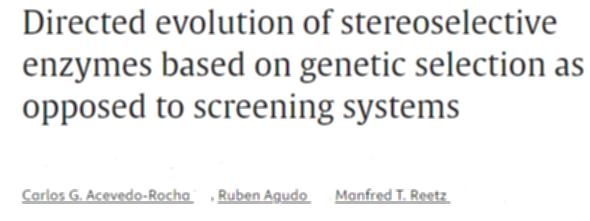Please use this identifier to cite or link to this item:
http://hdl.handle.net/10637/15711Directed evolution of stereoselective enzymes based on geneticselection as opposed to screening systems

See/Open:
Directed_Acevedo_Agudo_Reetz_JorBio_2014.PNG
19,37 kB
image/png
See/Open:
Directed_Acevedo_Agudo_Reetz_JorBio_2014.pdf
Restricted Access
1,14 MB
Adobe PDF
Request a copy
| Title: | Directed evolution of stereoselective enzymes based on geneticselection as opposed to screening systems |
| Authors : | Acevedo-Rocha, Carlos G Agudo Torres, Rubén Reetz, Manfred T. |
| Keywords: | Directed evolution; Display systems; FACS; Biocatalysis; Metabolic engineering |
| Publisher: | Elsevier |
| Citation: | Acevedo-Rocha CG, Agudo R, Reetz MT. Directed evolution of stereoselective enzymes based on genetic selection as opposed to screening systems. J Biotechnol. 2014 Dec 10;191:3-10. doi: 10.1016/j.jbiotec.2014.04.009 |
| Abstract: | tDirected evolution of stereoselective enzymes provides a means to generate useful biocatalysts for asym-metric transformations in organic chemistry and biotechnology. Almost all of the numerous examplesreported in the literature utilize high-throughput screening systems based on suitable analytical tech-niques. Since the screening step is the bottleneck of the overall procedure, researchers have consideredthe use of genetic selection systems as an alternative to screening. In principle, selection would be themost elegant and efficient approach because it is based on growth advantage of host cells harboring ste-reoselective mutants, but devising such selection systems is very challenging. They must be designed sothat the host organism profits from the presence of an enantioselective variant. Progress in this intrigu-ing research area is summarized in this review, which also includes some examples of display systemsdesigned for enantioselectivity as assayed by fluorescence-activated cell sorting (FACS). Although thecombination of display systems and FACS is a powerful approach, we also envision innovative ideascombining metabolic engineering and genetic selection systems with protein directed evolution for thedevelopment of highly selective and efficient biocatalysts. |
| Description: | Acceso al texto completo del artículo, disponible desde el sitio de la revista usando DOI: https://doi.org/10.1016/j.jbiotec.2014.04.009 This work was supported by the Arthur C. Cope Foundation andthe Max-Planck-Society |
| URI: | http://hdl.handle.net/10637/15711 |
| Rights : | http://creativecommons.org/licenses/by-nc-nd/4.0/deed.es |
| ISSN: | 1873-4863 |
| Issue Date: | 29-Apr-2014 |
| Center : | Universidad San Pablo-CEU |
| Appears in Collections: | Facultad de Farmacia |
Items in DSpace are protected by copyright, with all rights reserved, unless otherwise indicated.

